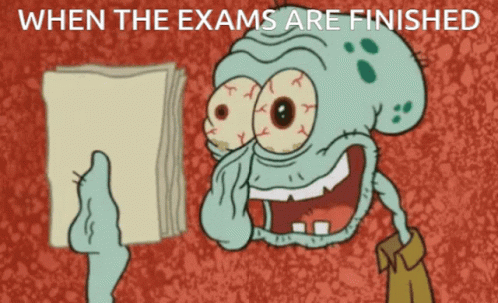These strategies were written with standardized testing in mind. Except for "narrowing down your choices" which is mainly for multiple choice questions, these strategies are applicable to any quizzes, tests, and exams!
It's difficult to give general exam advice but for major standardized tests, typically do not do more than 3-4 months of serious studying and preparation. Over that, you risk burn out. That 3-4 month mark optimizes the likelihood of all your studying, practice questions, strategy, and preparedness landing you a solid score on exam day. The only score that counts!
Trust Your Gut and DON'T CHANGE YOUR ANSWERS
I can't remember the statistic anymore. But the sentiment is something like unless you're 90%+ confident that your original answer is wrong and have strong reasoning for backing another answer, DO NOT CHANGE YOUR ANSWER. Your first instinct is almost always correct and I learned painfully (as in I was stubborn and refused to change my ways) that I was not an exception. I kept losing critical points that dropped me whole letter grades just because I changed my correct answers to wrong ones.. so I stopped.
Example: You pick B but upon checking your answers on your second run through of the exam, you start to doubt B and wonder if C is better. LEAVE it at B unless you are confident in your factual knowledge and reasoning as to why C is correct.
What is the Question Actually Asking
Depending on what exam you're taking and what works best for you, there are 2 approaches that were most helpful for a verbose, lengthy, challenging exam like the MCAT:
Method 1
- If the question has a LONG prompt, don't read it yet. Glance quickly at the answer choices to see what the scope of the answers are so you have an idea of what to read for
- Don't get bogged down in the details of the prompt or passage and focus on what the question is ASKING. The details are often there as word vomit to distract you and wear you down over the length of the exam. If you really need the detail, you can always refer back once you understand what the question is actually asking you.
Method 2
- To avoid reading the question for an answer, do NOT look at the answer choices at all until you've answered it for yourself in your head. Example: What color is a banana? Answer in your head: yellow. Really focus on what the question is asking. Exam takers can get caught reading for the answer they want and to confirm your own quick assumptions from the panic and stress. Slow down, comprehend the question.
- Now look at the choices. Ideally, you find your answer in black and white. From the above example, hopefully you find yellow as a choice. Or, you see your answer could fit well with 2 choices and you need to pick the best one. Worst case, you're SO off base and you panic. That's when you reread what the question is asking and figure out where you went wrong.
Narrowing Down Your Choices
If you are given 5 choices and can eliminate at least 2, the odds have shot up tremendously. It's now in your best interest to invest in providing your best effort. Guess if you must like you're in a rush, you have absolutely no clue, etc.
If you have time (thanks I believe to Dr. G for this one), write out on your scratch paper or whiteboard:
A is correct because ____. B is correct because ____. C is correct because _____. D is correct because ____. You will quickly realize that your spiraling brain that was making every answer sound good... is able to calm down. This is because writing it out prevents you from bringing in extraneous details and information to throw you off and it streamlines your thinking and logic into 1+1=2 type of thinking.
This strategy was a game changer for me on the tough questions that I knew, for me, were worth the extra time investment. These were questions I had enough of the content knowledge and using this strategy gave me a better statistical chance of answering correctly.
Skipping Questions
After you calculate how much time you are allotted per question on the exam you are taking, part of constant practice questions/exams is to get your internal clock adjusted to when you know you're taking too long. You will lose valuable time checking the clock on exam day constantly and should become really accustomed to when you should be halfway, when you need to make up for some lost time, etc.
Naturally with that skill, you'll know when it's simply not worth it anymore to try to understand the verbose question or figure out the calculations when you're blanking on an equation. Friend, it's time to mark it and skip it. BUT BEFORE YOU SKIP, you need to guess. You've probably already maxed out your time for a question panicking and it'll take even more mental energy if you're able to return to the question to get back into what it's asking. Make an educated guess and move yourself along! Those valuable seconds/minutes add up and are better invested in a question that you are statistically more likely to get correct.
For a later post, I'll talk about how to use your scratch paper. But this can be an opportunity to use it to mark this question as one you guessed and lower priority for returning to later.
Best Answer
Now I'm sure you've heard how there's always a best answer. It's true. In medical school, I got extremely frustrated failing quizzes and exams because I knew so much more than the exam was revealing. Partly because those exams had a standard of second-order to third-order questions. First order being rote memory. Second and third required you to apply pieces of varied information and/or inference. Girl, it was hard. Cue trauma tears...I'm not being dramatic I quite literally had PTSD from exams but it was not the same thing as test anxiety. We have a lot to talk about on this website ;)
That's why you need to focus on what you can control. Not that the question is too hard, the exam writers are unfair for asking it, that the phrasing is awkward, etc. STOP THAT and focus on getting the right answer!
What is the skill or knowledge or content that the question is testing? This is where knowing exam content breakdowns and outlines can help you in a pinch. For MCAT takers, are you in the biological sciences section? For child life certification exam takers, is this an intervention question? It can really help you to settle into the question to figure out what they're testing you on. Of course in real life you'd be able to ask more assessment questions in your patient interview, but this is a standardized test! Don't get lost in the sauce! The exam is designed to give you enough information to get to the best answer. Keep it that simple.
And if it's comforting, exams are standardized. Which means if a question has low performance among test-takers, it's going to be evaluated and it's not going to really make or break you overall. I don't care for statistics too much so y'all can go ahead if you're really interested but questions get thrown out and tested all the time. I don't know if it still does or if many students even bother taking it with how problematic it is for equitable admissions processes, but the SAT/ACT had "experimental" questions/section just for this purpose.
Good luck, stay healthy, and happy studying!

Shedding Light on Child Life is an independent publication launched in November 2024 by Anisha S. Reza, MS, CCLS. All posts and resources are curated from this author's professional opinion and expertise. Any questions, comments, or requests can be directed via email to childlifewithanisha@gmail.com.



Member discussion: